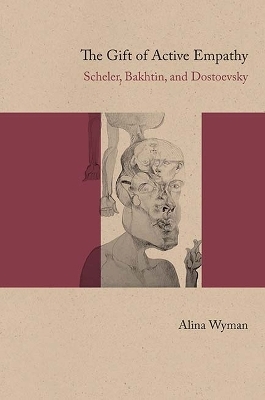
The Gift of Active Empathy
Scheler, Bakhtin, and Dostoevsky
Seiten
2016
Northwestern University Press (Verlag)
978-0-8101-3337-2 (ISBN)
Northwestern University Press (Verlag)
978-0-8101-3337-2 (ISBN)
This innovative study brings the early writings of Mikhail Bakhtin into conversation with Max Scheler and Fyodor Dostoevsky to explore the question of what makes emotional co-experiencing ethically and spiritually productive. Applying this rich and previously neglected theoretical apparatus in a literary analysis, Wyman examines the obstacles to active empathy in Dostoevsky's fictional world.
This innovative study brings the early writings of Mikhail Bakhtin into conversation with Max Scheler and Fyodor Dostoevsky to explore the question of what makes emotional co-experiencing ethically and spiritually productive. In Problems of Dostoevsky's Poetics, Bakhtin's well-known concept of the dialogical partner expresses what he sees as the potential of human relationships in Dostoevsky's work. But his earlier reflections on the ethical and aesthetic uses of empathy, in part inspired by Scheler's philosophy, suggest a still more fundamental form of communication that operates as a basis for human togetherness in Dostoevsky. Applying this rich and previously neglected theoretical apparatus in a literary analysis, Wyman examines the obstacles to active empathy in Dostoevsky's fictional world, considers the limitations and excesses of empathy, addresses the problem of frustrated love in The Idiot and Notes from Underground, and provides a fresh interpretation of two of Dostoevsky's most iconic characters, Prince Myshkin and Alyosha Karamazov.
This innovative study brings the early writings of Mikhail Bakhtin into conversation with Max Scheler and Fyodor Dostoevsky to explore the question of what makes emotional co-experiencing ethically and spiritually productive. In Problems of Dostoevsky's Poetics, Bakhtin's well-known concept of the dialogical partner expresses what he sees as the potential of human relationships in Dostoevsky's work. But his earlier reflections on the ethical and aesthetic uses of empathy, in part inspired by Scheler's philosophy, suggest a still more fundamental form of communication that operates as a basis for human togetherness in Dostoevsky. Applying this rich and previously neglected theoretical apparatus in a literary analysis, Wyman examines the obstacles to active empathy in Dostoevsky's fictional world, considers the limitations and excesses of empathy, addresses the problem of frustrated love in The Idiot and Notes from Underground, and provides a fresh interpretation of two of Dostoevsky's most iconic characters, Prince Myshkin and Alyosha Karamazov.
Alina Wyman is an assistant professor of Russian at New College of Florida, USA.
| Erscheinungsdatum | 02.09.2016 |
|---|---|
| Reihe/Serie | Studies in Russian Literature and Theory |
| Verlagsort | Evanston |
| Sprache | englisch |
| Maße | 152 x 229 mm |
| Gewicht | 606 g |
| Themenwelt | Geisteswissenschaften ► Philosophie ► Ethik |
| Geisteswissenschaften ► Sprach- / Literaturwissenschaft ► Anglistik / Amerikanistik | |
| Geisteswissenschaften ► Sprach- / Literaturwissenschaft ► Literaturwissenschaft | |
| Geisteswissenschaften ► Sprach- / Literaturwissenschaft ► Slavistik | |
| ISBN-10 | 0-8101-3337-7 / 0810133377 |
| ISBN-13 | 978-0-8101-3337-2 / 9780810133372 |
| Zustand | Neuware |
| Haben Sie eine Frage zum Produkt? |
Mehr entdecken
aus dem Bereich
aus dem Bereich
unsere kollektive Verantwortung
Buch | Hardcover (2023)
wbg Theiss in Wissenschaftliche Buchgesellschaft (WBG) (Verlag)
35,00 €


